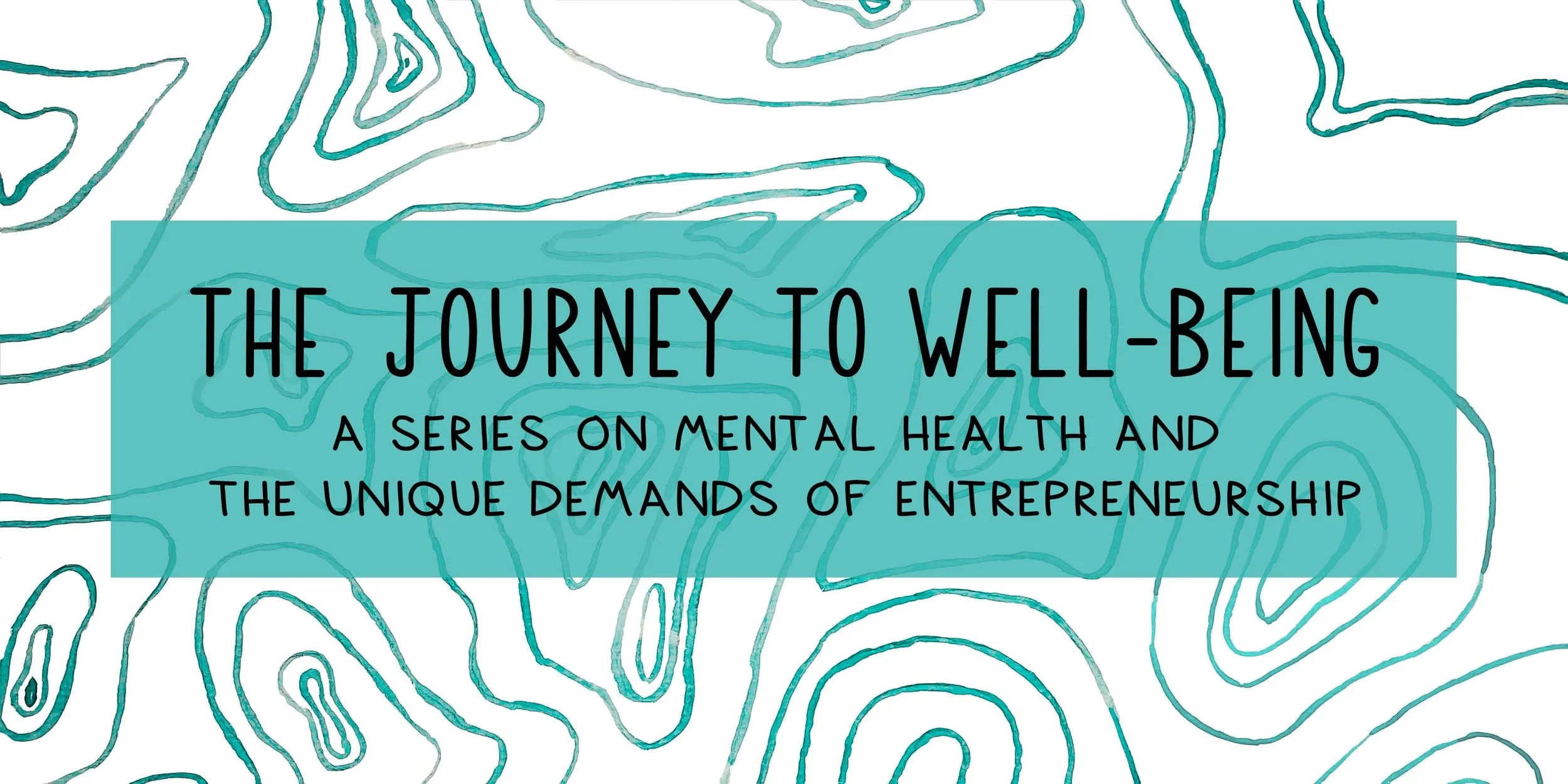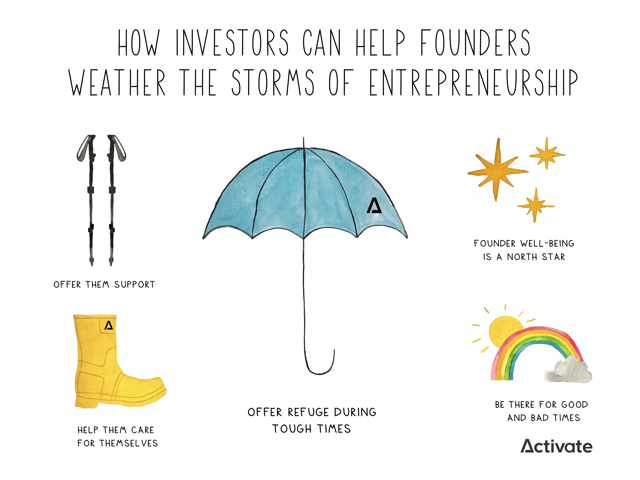How to Really Invest in Founders’ Success
July 25, 2023
.jpg)
Graphic by Nicole Kelner
The Journey to Well-Being
Read more from our series on founder mental health.
Paramedics. Social workers. Soldiers. Those are the kinds of roles you might associate with workplace trauma. But as we’ve explored in parts one and two in this “Journey to Well-being” series, being a founder comes with a significant emotional weight that should not be ignored.
“It's part of the founder's life,” says Tzahi (Zack) Weisfeld, the VP and general manager of Intel Ignite, an acceleration program for deep-tech startups. “You raise funding, then someone pulls your term sheet away. Your main customer may come or may go. [Maybe] your key developer just left in the middle of your most important proof of concept.” Founders can find themselves dealing with one disruption after another, and it can be traumatic.
To observe Mental Health Awareness Month in May, the co-founders of SoloPulse (Cohort 2022) shared how and why they’re making compassion, open dialogue, and support key elements of their company culture.
In a wide-ranging conversation this summer with psychological researcher and climate-change-focused strategist Renée Lertzman, we discussed the role that investors play in supporting founder well-being—particularly around climate anxiety.
She said investors should “give the investees permission to show up as their full human selves, because that is what will foster health and resilience at the end of the day.” They need to create a sense of psychological safety for founders.
So to wrap up this months-long focus on mental health and entrepreneurship, we asked Weisfeld as well as Marie Thompson, a partner at Powerhouse Ventures, how they think about this important role they play in founders’ support network, and what steps they’d like to see more investors take to support founders.
We at Activate are not mental health practitioners, and the following is not medical advice. If you believe you are experiencing depression or another mental illness, seek medical help. If you are experiencing a suicidal crisis or mental health-related distress, please call 988, the suicide and crisis lifeline.

Graphic by Nicole Kelner
Trust in the relationship
The dynamics of a founder-investor relationship are fraught by nature. From a founder’s perspective, there are many downsides to confiding in investors, says Intel’s Zack Weisfeld. “[Investors] may think they’ll look weak” if they voice their worries or anxieties to their investors,” he says. Or founders worry that if they confide in their investors, they’ll risk losing future investments.
Given that power dynamic, it’s not surprising that only 10 percent of founders confide in their investors, according to the Startup Snapshot survey released this spring.
“If you keep pushing rope on people who are burnt out, then everyone loses. ”
But both Weisfleld and Powerhouse’s Marie Thompson say that the founder-investor relationship can and should be one of support and openness. What’s more, they say that making it a more open, healthy relationship can pay both financial and emotional dividends.
For that to happen, however, investors need to change the narrative. Founders are simply under tremendous pressure, and it’s not just about money. Even though therapy and discussing—or just acknowledging—mental health struggles have become mainstream in the workplace, the Startup Survey found that only 23 percent have a therapist or executive coach. Founders often still feel shame when it comes to discussing mental health.
Breaking down and rebuilding the culture
In Thompson’s experience, a lot of investors come from banking, where “super toxic corporate climates” dominate and where investors face brutal schedules and expectations. “You're at every event, you're schmoozing all the time, you're constantly taking calls, and you're working 60-hour weeks,” she says, noting how successfully she feels Powerhouse Ventures has bucked that trend. “It's hard for that [lifestyle] not to spill over to founders.”
Weisfeld agrees. At the same time, he says, it’s hard for investors to model the kind of openness they might want to see from founders, given the pressure they’re under themselves—especially in the current economy. “I think that the investors are part of the problem because people are afraid of them,” he says.
So, then, how can investors change the narrative?
It starts with recognizing and normalizing the emotional toll of entrepreneurship, Thompson and Weisfeld say.
“Investors should understand that money to support wellness should be good for [the founders], good for the startup, and good for the outcome of that investment. ”
Investors should foster the kind of trust that founders would seek in a confidant. And that can start, ironically, with money. Founder well-being is “a critical investment,” Weisfeld says. That’s something that the investment community is starting to realize. Entrepreneur Naveed Lalani partnered with investor Brad Baum earlier this year to launch The Founder Mental Health Pledge, which encourages investment in the well-being of investors and founders alike. Just like accounting or legal counsel, Lalani says, maintaining mental wellness should be considered a business expense for founders.
However, Weisfeld doesn’t want to see investors tracking how founders choose to spend investment money earmarked for mental health support, or putting it in a special fund. Instead, it should be added to the main pot of funding. “Investors should understand that money to support wellness should be good for [the founders], good for the startup, and good for the outcome of that investment,” he says.
As an investor, beyond just the care she has for the founders in Powerhouse’s portfolio, Thompson views stressed founders who are verging on burn-out, or more significant mental illness, as an investment risk. In one scenario, founders of a company she invested in had stopped taking salaries because they were almost out of runway. They were extremely stressed and it impacted their personal lives. The founders exited, but that “wasn't the best outcome for the fund,” she says. “That was actually a pretty formative thing for me as an investor—to have not paid close enough attention to know [that] their quality of life and their salaries [were not enough] to support them through what is an incredibly stressful thing…to the point where it could hurt the fund” in addition to their own health.
Talking to people who understand
Weisfeld knows the pressures of entrepreneurship intimately, having spent decades as a founder both in Silicon Valley and in Israel, where he’s now based. And even though he had a wonderful support system in his family, he says as a founder sometimes felt like “the loneliest person on Earth.”
He thinks the trap that many founders fall into is that “they’re really good at doing, but not at being.” In other words, they excel when they’re moving, but they tend to avoid reflecting on their work. And it’s something tied, he believes, to the research showing that many entrepreneurs have ADHD. To counteract that, he works with founders to make room for stillness and mindfulness. While not easy to achieve, he says it can help them stay regulated, which also benefits their teams and can improve founders’ ability to manage and weather challenges.
Weisfeld is also a big advocate of therapy for founders, but he says it has to be approached the right way. “A lot of the therapists I know may not work at the pace that [founders] want to work,” he says, because, unlike founders, “therapists are often in the being mode versus in the doing mode.” He says what’s needed is “some kind of a translation layer. We need a group of therapists that actually understand that audience and can relate and connect better because then we'll build that trust early on. Then, the founders will be able to go through the second phase of actually opening up and talking about the challenges.”
Weisfeld is so committed to this vision of a “translation layer” that he’s pursuing a master's degree in psychotherapy, which he plans to use to develop a workforce of therapists who specialize in supporting founders’ mental health.
As for how investors can step into more emotionally supportive roles for founders, Thompson says starts with simply recognizing that founders are not machines with unlimited reserves, despite the move-fast-and-break-things ethos that Silicon Valley has promulgated.
“If you keep pushing rope on people who are burnt out, then everyone loses,” she says. “These aren't pawns. These are humans. And what they want really, really matters.”
